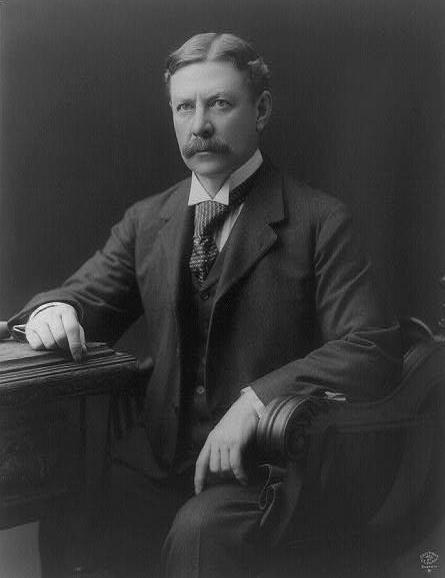- William Henry Moody
Infobox US Cabinet official
name=William Henry Moody

order=35th
title=United States Secretary of the Navy
term_start=May 1 ,1902
term_end=June 30 ,1904
predecessor=John D. Long
successor=Paul Morton
order2=46th
title2=United States Attorney General
term_start2=July 1 ,1904
term_end2=December 17 ,1906
predecessor2=Philander C. Knox
successor2=Charles J. Bonaparte
order3=Associate Justice of the Supreme Court of the United States
title3=
term_start3=December 17 ,1906
term_end3=November 20 ,1910
predecessor3=Henry Billings Brown
successor3=Joseph Rucker Lamar
birth_date=birth date|1853|12|23|mf=y
birth_place=Newbury, Massachusetts , U.S.
death_date=death date and age|1917|7|2|1853|12|23|mf=y
death_place=Haverhill, Massachusetts , U.S.
party=Republican
spouse=
profession=Politician ,Lawyer ,Judge
religion=William Henry Moody (
December 23 1853 –July 2 1917 ) was an American politician andjurist , who held positions in all three branches of theGovernment of the United States .Born a son of farmers in
Newbury, Massachusetts , Moody graduated fromPhillips Academy in 1872 and from Harvard in 1876, where he was a classmate and friend of future PresidentTheodore Roosevelt . After 4 months attendingHarvard Law School , he departed and instead took the then-common but now-unusual step of reading law underRichard Henry Dana, Jr. to pass the bar.Early in his legal career, Moody first was elected city solicitor of Haverhill in 1888. After appointment as the
U.S. Attorney for Eastern Massachusetts in 1890, he gained widespread notoriety in 1893 as the junior prosecutor in theLizzie Borden murder case. While his efforts were unsuccessful he was generally acknowledged as the most competent and effective of the attorneys on either side. He was elected to theU.S. House of Representatives fromMassachusetts , and served from 1895 until 1902 where he served on the powerful Appropriations Committee. During PresidentTheodore Roosevelt 's administration, Moody served as theSecretary of Navy (1902-1904) and as Attorney General (1904-1906). As Attorney General, Moody actively followed Roosevelt's trust-busting policies, negotiating with 'good' trusts like U.S. Steel but prosecuting 'bad' ones like Standard Oil. After failing to convinceWilliam Howard Taft to take the seat, onDecember 12 ,1906 , Roosevelt nominated Moody as an Associate Justice of theU.S. Supreme Court and Moody was confirmedDecember 17 1906 . [ [http://www.harpweek.com/09Cartoon/BrowseByDateCartoon.asp?Month=December&Date=29 HarpWeek: Cartoon of the Day ] at www.harpweek.com]Moody's service on the Court was brief but not uneventful, writing 67 opinions and 5 dissents. His most noted opinion was in the minority in "Employers Liability Cases" (1908), where he held that Congress' power to regulate interstate commerce included the ability to legislate management's relationship with employees. While he generally supported enhanced federal powers, opinions as "
Twining v. New Jersey " (1908), where he held that the Fifth Amendment's protection against compulsory self-incrimination did not apply to cases presented instate courts , made him hard to pigeonhole. He also wrote for a unanimous court in the famous case of "Louisville & Nashville Railroad Co. v. Mottley ", which limitedfederal question jurisdiction to cases in which theplaintiff 'scause of action was based on federal law.By 1908, Moody suffered severe
rheumatism . This affected Moody to such an extent that his last sitting on the bench wasMay 7 1909 , when he left for a brief rest and never returned. With the age- and health-enfeebled Supreme Court of 1909 crippled (PresidentWilliam Howard Taft was to make a record-setting 5 appointments due to death and resignations over a course of a single year in 1910-1911), Taft urged Moody, then the youngest justice at 55, to step down. After Taft successfully lobbied Congress for a Special Act to grant Moody retirement benefits not normally granted unless justices reached age 70 or 10 years of service (enactedJune 23 1910 ), Moody retired from the Court onNovember 20 1910 . [ [http://www.supremecourthistory.org/04_library/subs_volumes/04_c17_f.html The Supreme Court Historical Society ] at www.supremecourthistory.org] He died inHaverhill, Massachusetts ,July 2 1917 .After Moody's death, some of his official papers were placed in the custody of Professor
Felix Frankfurter , then ofHarvard Law School . They are now in the collection of Frankfurter's papers in the Manuscript Division of theLibrary of Congress .Legacy
USS "Moody" (DD-277) was named for him.
Bibliography
* Lewis L. Gould. "Moody, William Henry"; [http://www.anb.org/articles/06/06-00447.html; "American National Biography" Online Feb. 2000. ]
* James F. Watts, Jr., "William Moody," in "The Justices of the United States Supreme Court 1789-1969," ed. Leon Friedman and Fred L. Israel (1969),External links and sources
Persondata
NAME= Moody, William Henry
ALTERNATIVE NAMES=
SHORT DESCRIPTION=American politician
DATE OF BIRTH=December 23 ,1853
PLACE OF BIRTH=Newbury, Massachusetts ,United States
DATE OF DEATH=July 2 ,1917
PLACE OF DEATH=Haverhill, Massachusetts ,United States Notes
Wikimedia Foundation. 2010.
